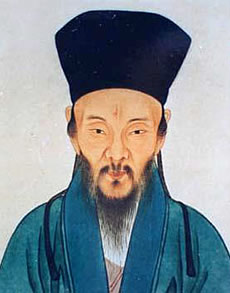 |
| Wang Yangming - Chinese Scholar |
Wang developed a philosophy that would have a dramatic effect not only on China but also on Japan and Korea, both of whose cultures were influenced by China. His teaching would be perpetuated through schools of philosophy during much of the 16th century.
Jacques Gernet wrote in A History of Chinese Civilization that “the central notion of his philosophy is that of ‘innate moral knowledge,’ (liang-chih), (the term is borrowed from Mencius), a principle of good which is inherent in the mind before any contamination by egoistic thoughts and desires, and which one must try to rediscover in oneself.”
Following Mencius, instead of Confucius, Wang Yangming aroused much controversy in Ming philosophical circles and the imperial government, since Confucian thought was at the bottom of the entire Chinese imperial system. There is much of his system that is Buddhist, especially that of the Chan school, carried by the monk Bodhidharma to China, that emphasized intuitive knowing.
  |
Wang Yangming’s idea that objects do not exist entirely apart from the mind because the mind shapes them stems from this. Here, Wang Yangming closely follows the Buddhist idea that the entire world is made up of maya, and thus is not entirely or truly real.
Mencius’s teaching had a warmth and intimacy that were lacking in Confucian thought. Mencius said, “Everyone has a heart that is sensitive to the sufferings of others. The great kings of the past had this sort of sensitive heart and thus adopted compassionate policies. Bringing order to the realm is as easy as moving an object in your palm when you have a sensitive heart and put into practice compassionate policies.”
Wang Yangming made an estimable contribution to Chinese philosophy, especially in his insistence on “the unity of knowledge and action.” A moderate individualist, he taught that knowledge should be the guide to proper conduct and that proper conduct thus is the fulfillment of knowledge.
 |
| Wang Yangming statue |